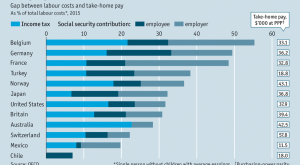In his slides, Charles Wyplosz presents a narrative that emphasizes vulnerabilities and institutional failures.
Read More »Views on the Fiscal Theory of the Price Level
A conference at the University of Chicago’s Becker Friedman Institute addressed the status of the Fiscal Theory of the Price Level and the theory’s implications for current policy. Slides and papers are available on the conference website. Given that the conference was meant to resuscitate research on the FTPL and that the participants were selected accordingly, many contributions appear rather mainstream. Chris Sims worries about indeterminacy of the price level if monetary policy is...
Read More »Taxing the Rich
In Taxing the Rich: A History of Fiscal Fairness in the United States and Europe, Kenneth Scheme and David Stasavage explore the intellectual and political debates surrounding the taxation of the wealthy while also providing the most detailed examination to date of when taxes have been levied against the rich and when they haven’t. Fairness in debates about taxing the rich has depended on different views of what it means to treat people as equals and whether taxing the rich advances or...
Read More »In Switzerland, New Bank Notes Render Old Notes Invalid
In the NZZ, Thomas Fuster reports about a consequence of the introduction of new banknotes in Switzerland: Old notes become invalid after a transition period of 20 years. Nach der Emission des letzten Notenwerts einer neuen Serie kündigt die Schweizerische Nationalbank (SNB) jeweils den Rückruf der alten Serie an. Danach können die Banknoten zwar noch während zwanzig Jahren bei den Kassenstellen oder Agenturen der Nationalbank zum Nennwert umgetauscht werden. In der Folge sind die Noten...
Read More »Nevada Shell Companies, Elliott and Argentina—Some Unforeseen Consequences
In an earlier post (April 2015) I wrote: The Economist reports about Nevada shell companies. In its eternal struggle against the Republic of Argentina, Elliott Management is inquiring about several shell companies in the state. They are suspected to own funds that might have been stolen from the Republic. The hedge fund reasons that it is entitled to those funds because they belong to Argentina, and Argentina owes 2 billion dollars to Elliott according to earlier court rulings. Elliott sued...
Read More »Tax Wedges
The average tax wedge in OECD countries has been stable over the last 15 years, at roughly 36 percent. OECD data. From The Economist, a decomposition in the cross section:
Read More »Lego Fintech
In the FAZ, Tim Kanning reports about highly specialized Fintech companies increasingly forming cooperations to better cater to customer needs. Portals rely on services by specialist providers.
Read More »Brexit: Minor Costs, Unclear Benefits (Given the Political Constraints)
A report by Open Europe argues that for the UK the cost of Brexit would be minor. The benefits might be minor as well. For interest groups could make it hard to reap the potential benefits of newly gained flexibility. … the path to prosperity outside the EU lies through: free trade and opening up to low cost competition, maintaining relatively high immigration (albeit with a different mix of skills), and pushing through deregulation and economic reforms in areas where the UK has...
Read More »Helicopter Drops of Money
In his blog, Ben Bernanke discusses the merits of “helicopter drops” as a monetary policy tool. [A] “helicopter drop” of money is an expansionary fiscal policy—an increase in public spending or a tax cut—financed by a permanent increase in the money stock. … the Fed credits the Treasury … in the Treasury’s “checking account” at the central bank, and those funds are used to pay for the new spending and the tax rebate. … it should influence the economy through a number of channels, making it...
Read More »The Panama Papers
Key figures from The Panama Papers.
Read More » Swiss Economicblogs.org
Swiss Economicblogs.org

